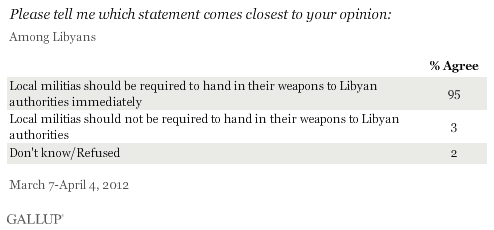WASHINGTON, D.C. -- Nearly all Libyans (95%) surveyed early this spring, before Tuesday's deadly attack on the U.S. Consulate in Benghazi, agreed that local militias should be required to hand in their weapons to authorities immediately.

The attack on the U.S. Consulate comes at a time when the new Libyan government is struggling to establish its authority over the whole of the country, with many groups that opposed Gadhafi remaining heavily armed after the conflict. Attacks in recent weeks on Sufi mosques and shrines highlight the increasing militancy of ultra-conservative Salafi groups in the country and the government's inability to stop them.
Reflecting their concern about this situation, the majority of Libyans see Islamic militant groups and Gadhafi loyalists as a major threat to their country's future. Still, Libyans are among the most hopeful populations in the Arab world that regional uprisings will actually bring about improved security, governance, and economic prospects -- and many see a role for the West in helping them achieve this. In fact, Libyans reported record-high approval of U.S. leadership in March and early April, and they expressed a strong desire to cooperate militarily with the West at that time.
Survey Methods
Results are based on face-to-face interviews with 1,002 adults, aged 15 and older, conducted March 7- April 4, 2012, in Libya. Some areas in the country were excluded for security reasons. Excluded areas represent approximately 20% of the population. For results based on the total sample of national adults, one can say with 95% confidence that the maximum margin of sampling error is ±3.3 percentage points. The margin of error reflects the influence of data weighting. In addition to sampling error, question wording and practical difficulties in conducting surveys can introduce error or bias into the findings of public opinion polls.
For more complete methodology and specific survey dates, please review Gallup's Country Data Set details.
